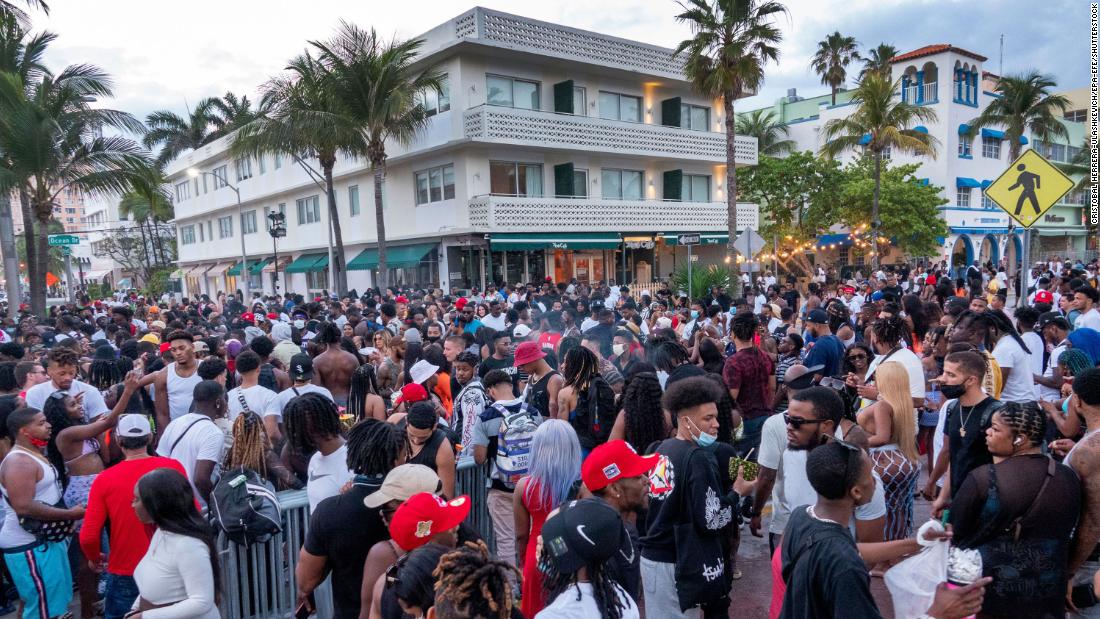“I don’t see anyone taking any precautions,” Pena, 32, told CNN. “Nobody is wearing masks, nobody is distancing themselves socially.”
Pictures from the South Florida spring break season offer little indication that a deadly virus is still spreading across the country. Last week, there were an average of about 54,600 new cases and more than 1,000 virus-related deaths reported every day in the United States, according to data from Johns Hopkins University.
“You see those pictures of people huddled in bars, for example, especially indoors, without masks, basically without physical distance,” said Cindy Prins, an epidemiologist at the University of Florida. “This creates an unfortunately ideal situation for the Covid broadcast.”
And the crowds show little sign of abating, with the Miami Beach police chief saying that visitors have multiplied in recent weeks – and the trend is likely to continue until April.
Pena is not only concerned with catching the virus on her own. As local officials and experts, she says she fears that the crowds could cause further spikes and devastation in her community and the country – which she experienced firsthand when she lost her grandmother to the virus in October.
“I am afraid of more deaths, as I witnessed and was part of the victims of Covid,” she said. “We are losing people left and right, because of carelessness and lack of consideration.”
South Florida residents with whom CNN spoke expressed the same concern, adding that they understand the difficult decisions of government leaders while trying to balance the desire for a healthy economy with the safety of a community. However, several residents said they want the state to receive visitors more safely, with tighter enforcement for those who break the rules.

People have fun along Ocean Drive on March 19, 2021 in Miami Beach, Florida
Joe Raedle / Getty Images
‘It doesn’t look good’
Emily Arcia, who lives in Miami, said months ago that she left the house only when absolutely necessary, only taking outdoor walks with her husband on the beach – and only after preparing with masks and gloves.
Although she was fully vaccinated, her husband just received his first injection, and leaving home – especially now – makes the pair nervous again.
“I live right in front of the ocean, I live right next to a park and it is crowded,” said Arcia, 66. “I don’t even go down on Saturdays and Sundays, because there are too many people.”
During the times when Covid-19 cases surfaced in the community, she heard first aid sirens from her porch – at a much more frequent rate than usual. It is a marker that she fears will appear again.
“I have no idea what can be done to prevent what I think will be an increase in cases,” she said. “I hope that the number of vaccines that are being … provided, will balance that out somehow. But, you know, it doesn’t look good.”
And it is not just the state that can see the consequences.
“It’s not just about what’s going to happen in Florida,” said emergency doctor Dr. Leana Wen. “It’s about what will happen when people go back to where they came from and become asymptomatic carriers who can transmit the virus to other vulnerable people.”
The return of spring breakers, she says, could fuel waves across the country.

A large crowd of people participate in a party on a walkway near the beach, during the spring break in Miami Beach on March 20, 2021
Cristobal Herrera-Ulashkevich / EPA-EFE / Shutterstock
Local leaders fear for lost progress

An overview of people partying at the Elbo Room on Fort Lauderdale beach on March 14, 2021
Larry Marano / Shutterstock
“We spent a lot of time and energy and reduced all of our key indicators,” Miami Mayor Francis Suarez told CNN on Thursday. “Obviously, spring break brings a flood of tourists and they may not be thinking as conscientiously as the people who stay here and have to deal with the repercussions later on.”
Gelber, in Miami Beach, is also scared. “We have a lot of people coming who just want to let go in ways that are unacceptable, and we have a pandemic, including, I think, really, central ground for the variant,” he said recently.
And experts, including Wen, have warned that as high levels of infection persist as the country works to vaccinate more Americans, it is more likely that the virus will continue to mutate and more worrying variants may emerge, which could not only be more communicable diseases – but they also pose a problem for vaccines.
“Therefore, the more disseminated by the community, the more these variants can develop and this can really slow us down,” said Wen.
CNN’s Travis Caldwell contributed to this report.
